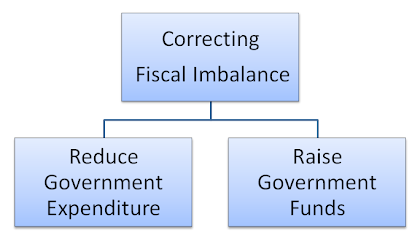Measures To Overcome Fiscal Imbalance In India - Fiscal Policy
 Measures To Overcome Fiscal Imbalance In India ↓
Measures To Overcome Fiscal Imbalance In India ↓
Fiscal imbalance takes place due to excess of government expenditure over revenue. To overcome the deficit, government resort to borrowings. This further aggravates the situation of debt servicing.
Therefore there is a need to correct and overcome the fiscal imbalance.
The fiscal imbalance can be corrected by adopting following two methods:-
- Reducing Government Expenditure.
- Raising proper financial resources (funds) for productive purposes.
 A. Reduce Government Expenditure ↓
A. Reduce Government Expenditure ↓
Suggested ways by which government's expenditure can be reduced are :-
1. Reduction in Interest Burden
Over the years, there has been considerable increase in Government borrowings. As a result, the interest payment of the Government has increased considerably. The interest payment has been the single major component of revenue expenditure of both the state and central government. For instance, the interest payment of the central government of India has increased from Rs.21,500 crores in 1990-91 to Rs.1,39,823 crores in 2005-06, which works out as 33% of the total revenue expenditure. Therefore, there is a need to reduce government borrowings so as to reduce interest burden, which in turn would reduce Government expenditure.
2. Reducing Subsidies
The government of India has been providing subsidies on a number of items such as food, fertilizers, education, interest to priority section, and so on. Because of the massive amounts of subsidies, the government expenditure has increased over the years. Therefore there is need to reduce government subsidies.
3. Reduction in Government Overheads
The public sectors and government departments are subject to high overheads. There is often overstaffing due to poor manpower planning. Also, there are huge overheads in respect of maintenance of machines, consumption of energy, and so on. Some of the overheads can be easily reduced. Therefore, there is a need to reduce overheads, wherever possible, in order to reduce Government expenditure.
4. Closure of Sick Units
The government needs to close down the sick public sectors or disinvest them. Closing down non-viable sick units would enable the government to save their valuable resources which otherwise would have been used for such sick units. Disinvestment would generate additional revenue to the government. In India, the disinvestment process was started in 1991-92. However, the process of disinvestment is very slow in India due to political compulsion.
 B. Raise Government Funds ↓
B. Raise Government Funds ↓
Suggested ways by which government's funds can be raised are :-
1. Collection of user charges
The government should take adequate measures to collect user charges from the consumer in respect of public utilities like water supply, electricity, irrigation, transport, etc. The user charges are subsidized in case of certain services.
2. Improvement in Performance of PSUs
Due to poor performance of PSUs, the government loses a good amount of revenue by way of dividends. Therefore, the government should make every effort to improve efficiency and performance of public sector units (PSUs), which in turn would enable the government to obtain more funds for productive expenditure.
3. Proper Mobilization of Tax Resources
In India there is a good deal of tax evasion both of direct and indirect taxes.
The tax evasion is due to the following reasons :-
- High tax rates,
- Too many formalities and documentation work,
- Inefficient and corrupt tax administration.
Therefore, the government should make proper efforts to simplify the tax procedures, and at the same time take appropriate measures to reduce tax evasion.
4. Market oriented development
Market oriented development will stimulate demand and encourage growth. Incentives are given through the fiscal policy to encourage the private sector investments. The areas of operation of public sector enterprises have been reduced. This will reduce governments borrowing and its dependence on household savings.
 New Fiscal Policy of India ↓
New Fiscal Policy of India ↓
In view of the economic liberalization in the recent years, certain themes have been emphasized in the New Fiscal Policy of India. They are :-
- Simplification of tax structure and laws.
- Reasonable direct taxes and better administration.
- Stable tax policy environment.
- Weightage to resource allocation and equity consequences of taxation.
- More reliance on fiscal and financial instrument in managing the economy.
- Better links between fiscal and monetary policy.
- Strengthening methods of expenditure control.
 Final Conclusion ↓
Final Conclusion ↓
The Fiscal measures adopted by the Govt of India would reduce the inflation, reduce the deficit in balance of payments and promote growth and generate employment. The effects of the new fiscal policy are likely to be favourable to the indian economy.

No Comment Yet
Please Comment